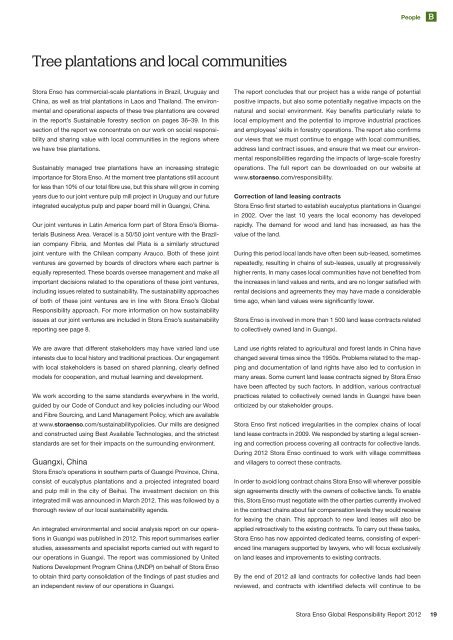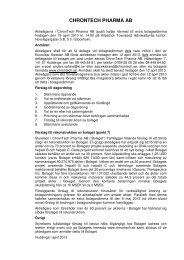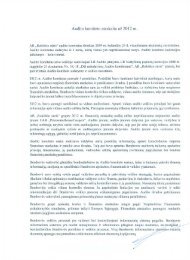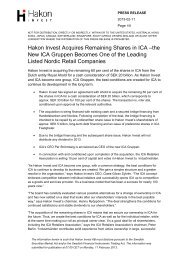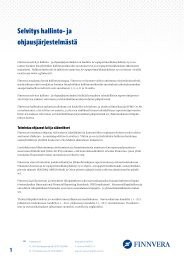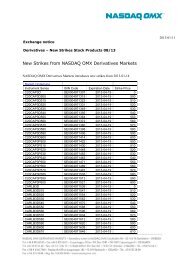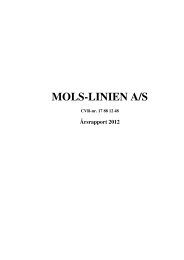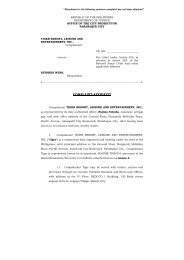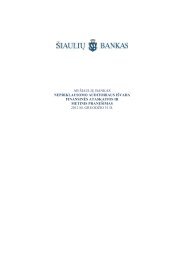Stora Enso Global Responsibility Report 2012 - GlobeNewswire
Stora Enso Global Responsibility Report 2012 - GlobeNewswire
Stora Enso Global Responsibility Report 2012 - GlobeNewswire
Create successful ePaper yourself
Turn your PDF publications into a flip-book with our unique Google optimized e-Paper software.
People<br />
B<br />
Tree plantations and local communities<br />
<strong>Stora</strong> <strong>Enso</strong> has commercial-scale plantations in Brazil, Uruguay and<br />
China, as well as trial plantations in Laos and Thailand. The environmental<br />
and operational aspects of these tree plantations are covered<br />
in the report’s Sustainable forestry section on pages 36–39. In this<br />
section of the report we concentrate on our work on social responsibility<br />
and sharing value with local communities in the regions where<br />
we have tree plantations.<br />
Sustainably managed tree plantations have an increasing strategic<br />
importance for <strong>Stora</strong> <strong>Enso</strong>. At the moment tree plantations still account<br />
for less than 10% of our total fibre use, but this share will grow in coming<br />
years due to our joint venture pulp mill project in Uruguay and our future<br />
integrated eucalyptus pulp and paper board mill in Guangxi, China.<br />
Our joint ventures in Latin America form part of <strong>Stora</strong> <strong>Enso</strong>’s Biomaterials<br />
Business Area. Veracel is a 50/50 joint venture with the Brazilian<br />
company Fibria, and Montes del Plata is a similarly structured<br />
joint venture with the Chilean company Arauco. Both of these joint<br />
ventures are governed by boards of directors where each partner is<br />
equally represented. These boards oversee management and make all<br />
important decisions related to the operations of these joint ventures,<br />
including issues related to sustainability. The sustainability approaches<br />
of both of these joint ventures are in line with <strong>Stora</strong> <strong>Enso</strong>’s <strong>Global</strong><br />
<strong>Responsibility</strong> approach. For more information on how sustainability<br />
issues at our joint ventures are included in <strong>Stora</strong> <strong>Enso</strong>’s sustainability<br />
reporting see page 8.<br />
The report concludes that our project has a wide range of potential<br />
positive impacts, but also some potentially negative impacts on the<br />
natural and social environment. Key benefits particularly relate to<br />
local employment and the potential to improve industrial practices<br />
and employees’ skills in forestry operations. The report also confirms<br />
our views that we must continue to engage with local communities,<br />
address land contract issues, and ensure that we meet our environmental<br />
responsibilities regarding the impacts of large-scale forestry<br />
operations. The full report can be downloaded on our website at<br />
www.storaenso.com/responsibility.<br />
Correction of land leasing contracts<br />
<strong>Stora</strong> <strong>Enso</strong> first started to establish eucalyptus plantations in Guangxi<br />
in 2002. Over the last 10 years the local economy has developed<br />
rapidly. The demand for wood and land has increased, as has the<br />
value of the land.<br />
During this period local lands have often been sub-leased, sometimes<br />
repeatedly, resulting in chains of sub-leases, usually at progressively<br />
higher rents. In many cases local communities have not benefited from<br />
the increases in land values and rents, and are no longer satisfied with<br />
rental decisions and agreements they may have made a considerable<br />
time ago, when land values were significantly lower.<br />
<strong>Stora</strong> <strong>Enso</strong> is involved in more than 1 500 land lease contracts related<br />
to collectively owned land in Guangxi.<br />
We are aware that different stakeholders may have varied land use<br />
interests due to local history and traditional practices. Our engagement<br />
with local stakeholders is based on shared planning, clearly defined<br />
models for cooperation, and mutual learning and development.<br />
We work according to the same standards everywhere in the world,<br />
guided by our Code of Conduct and key policies including our Wood<br />
and Fibre Sourcing, and Land Management Policy, which are available<br />
at www.storaenso.com/sustainabilitypolicies. Our mills are designed<br />
and constructed using Best Available Technologies, and the strictest<br />
standards are set for their impacts on the surrounding environment.<br />
Guangxi, China<br />
<strong>Stora</strong> <strong>Enso</strong>’s operations in southern parts of Guangxi Province, China,<br />
consist of eucalyptus plantations and a projected integrated board<br />
and pulp mill in the city of Beihai. The investment decision on this<br />
integrated mill was announced in March <strong>2012</strong>. This was followed by a<br />
thorough review of our local sustainability agenda.<br />
An integrated environmental and social analysis report on our operations<br />
in Guangxi was published in <strong>2012</strong>. This report summarises earlier<br />
studies, assessments and specialist reports carried out with regard to<br />
our operations in Guangxi. The report was commissioned by United<br />
Nations Development Program China (UNDP) on behalf of <strong>Stora</strong> <strong>Enso</strong><br />
to obtain third party consolidation of the findings of past studies and<br />
an independent review of our operations in Guangxi.<br />
Land use rights related to agricultural and forest lands in China have<br />
changed several times since the 1950s. Problems related to the mapping<br />
and documentation of land rights have also led to confusion in<br />
many areas. Some current land lease contracts signed by <strong>Stora</strong> <strong>Enso</strong><br />
have been affected by such factors. In addition, various contractual<br />
practices related to collectively owned lands in Guangxi have been<br />
criticized by our stakeholder groups.<br />
<strong>Stora</strong> <strong>Enso</strong> first noticed irregularities in the complex chains of local<br />
land lease contracts in 2009. We responded by starting a legal screening<br />
and correction process covering all contracts for collective lands.<br />
During <strong>2012</strong> <strong>Stora</strong> <strong>Enso</strong> continued to work with village committees<br />
and villagers to correct these contracts.<br />
In order to avoid long contract chains <strong>Stora</strong> <strong>Enso</strong> will wherever possible<br />
sign agreements directly with the owners of collective lands. To enable<br />
this, <strong>Stora</strong> <strong>Enso</strong> must negotiate with the other parties currently involved<br />
in the contract chains about fair compensation levels they would receive<br />
for leaving the chain. This approach to new land leases will also be<br />
applied retroactively to the existing contracts. To carry out these tasks,<br />
<strong>Stora</strong> <strong>Enso</strong> has now appointed dedicated teams, consisting of experienced<br />
line managers supported by lawyers, who will focus exclusively<br />
on land leases and improvements to existing contracts.<br />
By the end of <strong>2012</strong> all land contracts for collective lands had been<br />
reviewed, and contracts with identified defects will continue to be<br />
<strong>Stora</strong> <strong>Enso</strong> <strong>Global</strong> <strong>Responsibility</strong> <strong>Report</strong> <strong>2012</strong> 19


